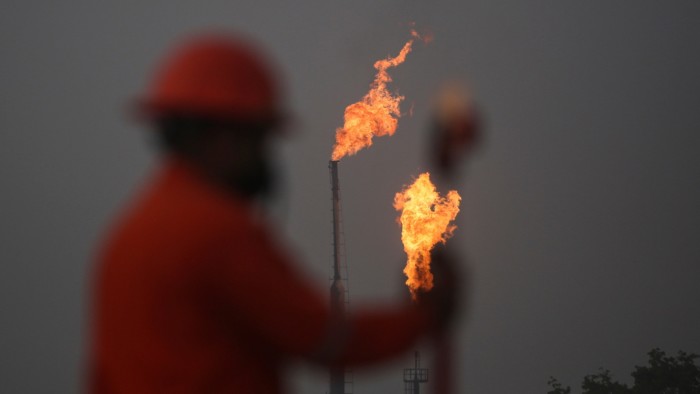Unlock the Editor’s Digest for free
Roula Khalaf, Editor of the FT, selects her favourite stories in this weekly newsletter.
Mexico’s government is talking to the private sector about expanding fracking as Donald Trump’s trade threats heighten fears over the country’s dependence on US gas, four executives with knowledge of the conversations have said.
Mexico relies on its northern neighbour for 70 per cent of its gas supply, meaning an unpredictable US president could plunge parts of the country into darkness within days. The move towards fracking, long a taboo in President Claudia Sheinbaum’s leftwing ruling party, joins a global trend of countries aiming to cut their exposure to American trade.
Sheinbaum, a former climate scientist, directed officials to explore fracking to help deliver energy independence, the executives said, while government officials had asked companies for their views on developing Mexican shale gas.
Mexican law allows fracking but its use is extremely limited, with parts of Sheinbaum’s party and environmentalists opposing the practice because of its ecological dangers. Ex-president Enrique Peña Nieto began a process to award contracts in 2018, but they were swiftly cancelled by his successor, Sheinbaum’s mentor Andrés Manuel López Obrador.

Mexico has the sixth-largest recoverable shale gas reserves in the world, according to US government data. Tapping those resources could also provide a timely economic boost as Washington’s largest trading partner teeters on the edge of recession.
While companies are interested in investing, discussions among Sheinbaum’s team are preliminary and any policy changes could take months to materialise, the executives said.
But the government’s quiet change of approach could mark the beginning of a new phase for the energy sector. Investment would probably happen via a new mixed public-private partnership model Sheinbaum recently passed into law, the people said.
As an event on Thursday, Sheinbaum said she wanted to reduce natural gas imports from the US by increasing production in Mexico to 3.834bn cu ft a day to 5bn cu ft a day by 2030 with “sustainable” methods.
Victor Padilla, chief executive of embattled state-owned oil company Pemex, has hinted publicly at the government’s desire to renew fracking. Speaking last month to a forum of “non-conventional hydrocarbon” experts, he said Mexico’s conventional reserves were nearly exhausted and he wanted to know what was in the ground.
The government wanted “an opinion from those who know what’s in the subsoil . . . the opportunities we have, how much it would cost and what we could get”, Padilla told experts at the Mexican College of Petroleum Engineers.
Some of Mexico’s reserves are in the Burgos Basin, an extension near the US border that connects to the Eagle Ford shale basin in Texas, one of the largest shale areas in the US. Advocates say fracking would help reverse decades of decline in oil and gas, as mismanagement made Pemex the world’s most indebted oil company.
The apparent policy shift reflects Sheinbaum’s struggle with contradictory promises to deliver energy independence and rescue Pemex, while also creating a plan to nearly double the share of Mexico’s energy that comes from clean sources by 2030.
López Obrador proposed a constitutional ban on fracking that was not enacted. But Sheinbaum, who contributed to two groundbreaking UN climate reports, is working in a new environment of trade protectionism and uncertainty, even as many Mexican goods have escaped US tariffs.
“On our shirts where it says, ‘Pemex rescuing our sovereignty’, it also means rescuing the resources we have and making the most of the resources we have to be sovereign,” Padilla said. “If we don’t have resources we can’t take decisions and we depend on others.”

The Mexican presidency and energy ministry did not respond to requests for comment.
Reactivating fracking would detract from Sheinbaum’s international image as a leftwing climate academic. And the practice’s ecological risks mean its revival would probably be incendiary for parts of the ruling Morena party’s base.
Recommended
Sheinbaum has consistently avoided direct criticism of her mentor while cautiously switching gears in policy areas including security.
Her government also desperately needs more revenue. López Obrador’s heavy spending at the end of his term left the country with a significant budget deficit. Leading economists were predicting a recession before Trump announced the softer tariffs on Mexico and Canada on Wednesday.
Pemex is also a drag on finances, while analysts have warned Mexico’s investment-grade credit rating could be at risk in the medium term.
Data visualisation by Cleve Jones and Keith Fray




